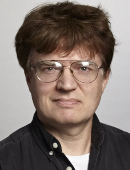Biography
Research Topics
Bioinformatics, Computational Biology, Computer Simulation, Coronavirus, Evolution, Gene Expressions, Gene Regulation, Genomics, Immunology, Infectious Disease, Inflammation, Influenza Virus, Mathematical Modeling of Biomedical Systems, Metabolomics, Proteomics, SARS Virus, Systems Biology, Theoretical Biology
Bioinformatics, Computational Biology, Computer Simulation, Coronavirus, Evolution, Gene Expressions, Gene Regulation, Genomics, Immunology, Infectious Disease, Inflammation, Influenza Virus, Mathematical Modeling of Biomedical Systems, Metabolomics, Proteomics, SARS Virus, Systems Biology, Theoretical Biology
Multi-Disciplinary Training Area
Genetics and Genomic Sciences [GGS], Immunology [IMM], Microbiology [MIC]
Genetics and Genomic Sciences [GGS], Immunology [IMM], Microbiology [MIC]
